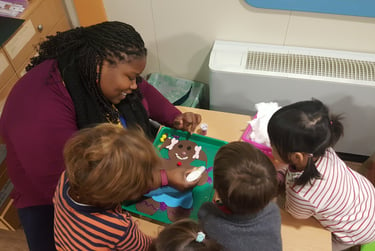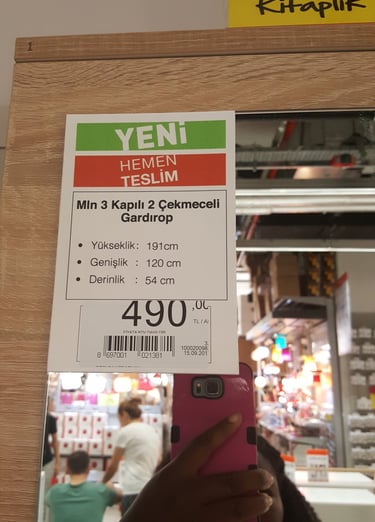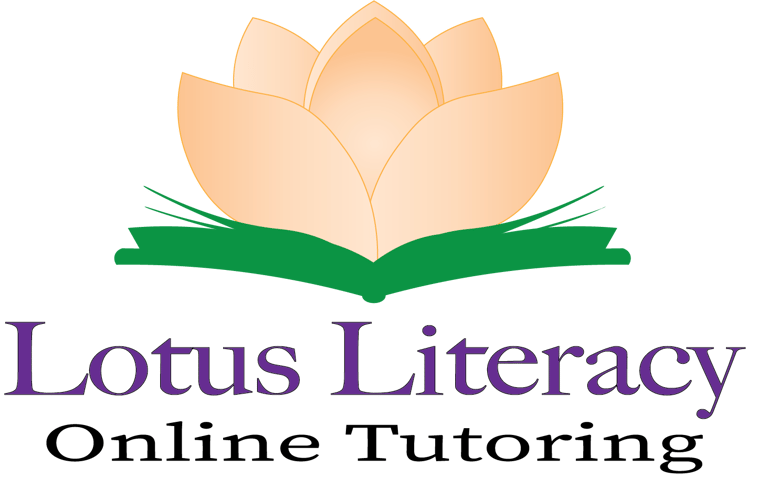I Was an Illiterate Adult
Read about my experience with illiteracy in a new language and how this experience parallels with students who struggle to read every day.
Janeen Turner
5/17/20256 min read
Travel with me to the faraway city of Istanbul, Turkiye. The year was 2017 and I had just made a big move. Istanbul was my new home, and I would be teaching primary school children at an international school. The language of instruction at school was English. Aside from a few basic greetings and phrases, I hadn't actually learned Turkish yet. For the first time since preschool, I was functionally illiterate.
Just so there is no confusion, I should clarify that I was illiterate in the Turkish language. It would take a bit of time for me to learn the Turkish alphabet sounds and word pronunciations. Simply typing a phrase into a translation app didn't mean that I could automatically say that phrase correctly in this new language. In the Turkish language, the digraphs /sh/ and /ch/ are spelled with individual letters. The letter Cc sounds like and English Jj. The language also has some extra vowel sounds that are not common in the English language. Although I knew that my knowledge of the new language would develop and improve with time, I felt like a preschool student learning the rules of reading again. I had to develop phonemic awareness of the sounds in Turkish words. I had to develop phonics in order to understand the letter sound correspondence.
As a teacher, I will forever be grateful for being thrust into illiteracy as an adult.
Literacy is something that is very easy to take for granted. We see printed words all around us. It tells us which line to wait in at the bank and which aisle in the grocery store has the product we are looking for. It helps us to read definitions of new words. The ability to read is empowering in many ways. When I began life in Turkey, I felt a new connection with my students who were simultaneously learning to speak, read, and write English. Whether living in North Carolina, Kuwait, or Turkiye, for a majority of my teaching career, I have taught a high population of students who came from non-English speaking households. These were not ESL classrooms. I have simply been fortunate to work with diverse populations.
Here are some observations from my time of learning to read and write in Turkish
Illiteracy Is Overwhelming
Not long after my arrival in Istanbul, I had to visit a grocery store. Unlike Spanish, Turkish does not share many food name cognates with English. Even when using a translation app, it was initially difficult to locate the matching item in stores. I even found it difficult to ask for help because I didn't know how to properly pronounce words. I can remember eating turkey sandwiches and chips for dinner for the first couple of weeks in the country because trying to find everything on my grocery list was overwhelming.
Many students who don't read well are also overwhelmed by the tasks that require reading. They may insist upon only trying assignments that seem familiar to them, like me and my turkey sandwiches. They may behave disruptively in order to avoid the task altogether. Some students cheat using classmates or artificial intelligence. Others just give up trying. No matter how students react to the challenge of reading based assignments, a vast majority of them would actually prefer to be able to read and understand the assignment at hand.
Illiteracy limits independence
Shortly after my arrival in Turkey, I learned the word yabancı (pronounced yabunjah). I also learned they were talking about me or my other foreign friends when they used it. The word means foreigner, and it is not a slur. My job arranged for new teachers to go together to get sim cards for our cell phones or open a bank account. This allowed one or 2 Turkish staff members to translate for the group of 4 to 8 foreigners in one trip. We were a group of fully grown adults who needed our Turkish colleagues to hold our hands through basic adulting processes because we were functionally illiterate.
I´ve taught early childhood grades for many years. One of our biggest goals is to lead students toward greater independence. Inability to read eventually hinders academic independence for young learners. The student who is unable to read often struggles with writing as well. Completing pencil and paper based tasks prove to be a great challenge. These students may be paired with more literate peers for support. However, they soon learn that they are more often the one who is offered support rather than the one who can offer support to others. They may lean into a pattern of helplessness, always waiting for others to swoop in and guide them through assignments. If you follow any middle and high school teachers on social media, you will hear complaints about this problem with older students. These students may become angry or resentful that they need help in the first place. Even young children have pride and want to maintain that with their peers.
Illiteracy Impacts Comprehension
The good news is that I did eventually learn to read and write in Turkish. In the beginning, I was like a kindergarten student needing reassurance and gentle correction with words. Eventually, I progressed from reading individual words to reading sentences. It was a wonderful feeling to finally reach that point. However, I often had to reread multiple times in order to actually comprehend what the sentences meant.
This is not uncommon for readers. When struggling readers spend a great deal of energy on simply reading the words correctly, they often will not understand what has been read. In lower grades, there is often additional support for struggling readers. However, by third grade, students are expected to to read paragraphs of information for different subjects and understand what they read. If students are still struggling with the basics of reading words, they will have a very difficult time with basic comprehension. Furthermore, requirements to answer comprehension questions will likely lead to frustration for the student.
Being an illiterate adult in Turkiye is EASIER than being illiterate in elementary school.
Although it might seem crazy to some that I moved abroad without learning the language in advance, I knew what I was getting into. I had several English speaking friends and coworkers who were learning along with me. I had translation apps on my phone that would translate pictures of text into English. I could afford to pay a private language tutor. I was a Black woman in a country that doesn't have a large Black population. Turkish people quickly observed that I was a foreigner and showed patience with me in social settings. Additionally, my work responsibilities were in English.
Compare my situation to a third grade student who has a first grade level of literacy. This student will not have a phone in class to read assignments out loud to her. This student will not have the means to pay a reading tutor herself. This student will be immersed in a print rich environment for the entire school day every day, but will only understand a portion of what she reads. She will have task assigned throughout the day in language arts, social studies, math, and science that have directions and reading materials written for students who read at a third grade level. Can you see how this could be problematic for this child? For student, they will have a majority of their school day requirements at a reading level that exceeds their reading ability.
Literacy Is For Everyone
As mentioned previously, I will forever appreciate being reminded as an adult of how critical literacy is for our daily lives. I believe that students deserve the opportunity to learn to read because reading is a key to accessing so much in this world. Perhaps the strategies used in your child's classroom didn't help them reach the level that they should be reading. This doesn't mean that we should give up or allow the child to give up on themselves. There is too much at stake. Everyone deserves to have the ability to read and write in this world.




Working with my students in Istanbul, Turkiye


